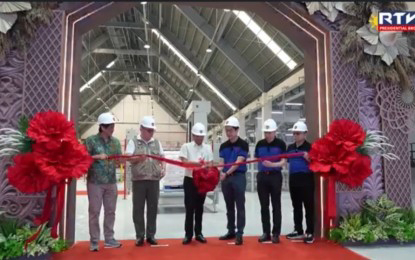COURTESY: PNA
In the heart of Sariaya, Quezon, a groundbreaking event marked the dawn of a promising future for the Philippine food industry. President Ferdinand R. Marcos Jr. recently inaugurated the Universal Robina Corporation’s (URC) state-of-the-art, 10-hectare flour milling plant, a facility poised to stir a revolution in economic growth and food security. With the potential to produce an impressive 3,500 metric tons of flour daily, this plant isn't just a testament to industrial prowess—it's a beacon of hope for innovation, sustainability, and national advancement.
What does it take to secure a nation's food supply? For URC, it means leveraging cutting-edge technology and sustainable practices to meet the evolving demands of the market. President Marcos highlighted the plant’s role in shaping the future of the Philippine food industry, emphasizing its capacity to fuel economic growth. This new plant positions URC as a key player not just in the local market but potentially across the ASEAN region.
The magic lies in its ability to manufacture customized flour products that cater to specific customer needs. This flexibility ensures that URC remains relevant and competitive, responding swiftly to market changes and consumer preferences. As such, it doesn’t just meet demand; it anticipates it, setting a new standard for food security and economic stability.
Innovation and sustainability are more than just buzzwords—they are the pillars of URC’s new facility. By focusing on reducing wastage and minimizing the carbon footprint, URC demonstrates a firm commitment to the environment. This plant isn't just about churning out flour; it’s about doing so responsibly and efficiently, ensuring that every grain counts.
Such advancements signify a shared responsibility between the government and private sectors to build a more resilient future. President Marcos underscored this during his speech, acknowledging URC's role in addressing the flour production gap. With this facility’s upgrades, the company enhances its operations while simultaneously addressing the nutritional needs of countless Filipinos. This dual focus on efficiency and sustainability is what sets URC apart as a leader in the industry.
President Marcos didn’t just praise URC’s technological strides; he pledged ongoing support for partnerships that bolster economic growth. These collaborations are vital in advancing socio-economic development, boosting farm productivity, and supporting micro, small, and medium enterprises (MSMEs). Through robust policies and agreements, the government aims to create a supportive environment that benefits both manufacturers and consumers.
URC’s role extends beyond flour production; it’s a steadfast partner in supplying high-quality foods, supporting local industries, and creating employment opportunities for Filipinos. This partnership exemplifies how the private sector can work hand-in-hand with the government to drive national progress.
As we stand on the brink of a new era in food production, URC’s flour milling plant symbolizes more than industrial achievement. It represents a collective resolve to address pressing challenges and seize opportunities for growth. By fostering innovation and sustainability, this facility is set to transform the landscape of the Philippine food industry.
The implications of such a project are vast. Beyond boosting local economies and securing food supplies, it reinforces the Philippines' position as a significant player in the ASEAN market. This plant is not just an investment in infrastructure; it's an investment in the future of the nation.
In conclusion, the inauguration of URC’s flour milling plant is a landmark event that promises to reshape the Philippine food industry. With its focus on innovation, sustainability, and partnerships, it paves the way for a more secure and prosperous future. As President Marcos aptly put it, every grain produced here counts towards nourishing the nation and building a stronger, more resilient economy.




No comments:
Post a Comment